Salvadore Cammarano
Birth : 1801-03-19, Naples, Italy
Death : 1852-07-17
History
From Wikipedia, the free encyclopedia - https://en.wikipedia.org/wiki/Salvadore_Cammarano.
Salvadore Cammarano (also Salvatore) (born Naples, 19 March 1801 - died Naples 17 July 1852) was a prolific Italian librettist and playwright perhaps best known for writing the text of Lucia di Lammermoor (1835) for Gaetano Donizetti.
For Donizetti he also contributed the libretti for L'assedio di Calais (1836), Belisario (1836), Pia de' Tolomei (1837), Roberto Devereux (1837), Maria de Rudenz (1838), Poliuto (1838), and Maria di Rohan (1843), while for Giuseppe Persiani he was the author of Ines de Castro.
For Verdi he wrote Alzira (1845), La battaglia di Legnano (1849) and Luisa Miller (1849), but after he died in July 1852, Verdi worked with Leone Emanuele Bardare to complete the libretto for Il trovatore (1853). Cammarano also started work on libretto for a proposed adaptation of William Shakespeare's play King Lear, named Re Lear, but he died before completing it; a detailed scenario survives.
His father, Giuseppe, was a painter and set-designer. His son, Michele, was also a painter.
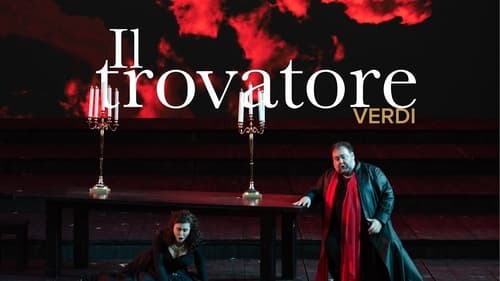
Writer
As Aragon descends into unrest, a count jealously fights for a noble lady's heart. But she has already given it to a passionate troubadour whose mother holds a terrible secret.
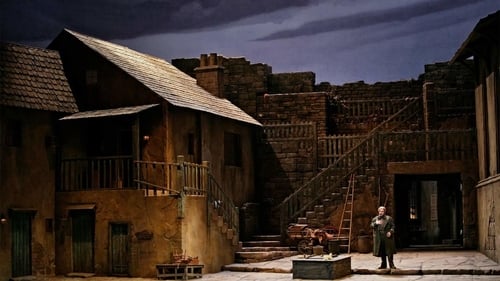
Writer
Premiered immediately before the enduring masterpieces Rigoletto, Il Trovatore, and La Traviata, Luisa Miller incorporates the youthful vitality that had made Verdi an international sensation while also looking forward to the dramaturgical discipline and sophistication of those later works. In this Live in HD performance, soprano Sonya Yoncheva takes on the riveting title role, capping off a season in which she starred in three cinema transmissions. As her father, Miller, the legendary Plácido Domingo adds another baritone role to his extensive repertoire. Tenor Piotr Beczała as Rodolfo, Alexander Vinogradov as Count Walter, and Dmitry Belosselskiy as Wurm round out the illustrious cast, and Bertrand de Billy conducts.

Writer
In the last and most dramatic aria in Roberto Devereux , one of the four Tudor period operas composed by Donizetti in 1837 (along with Anna Bolena , Maria Stuarda and Il Castello di Kenilworth), the protagonist, Queen Elizabeth I of England, exclaims: "I do not reign, I do not live". This statement encapsulates great operatic themes, and it is the culmination of an opera that reveals the passions of characters who live among palace intrigues. Written in the mature period of the leader of Italian romanticism, the opera displays a great vocal virtuosity, and is an example of Donizetti prizing the voice above all in the genre. The staging, by South African director Alessandro Talevi, who has been very successful in great opera houses as well as with more experimental theatre, places the play in an undetermined period, focusing on the chiaroscuro. Bruno Campanella conducts.

Writer
Diana Damrau’s reputation as the world’s leading coloratura soprano has been built on her extraordinary technical virtuosity, her sensitive musicianship and her acute psychological insight. In this DVD of Katie Mitchell’s sometimes radical production of Lucia di Lammermoor from London’s Royal Opera House, she is, as the Financial Times wrote, “brilliantly convincing”. The British award winning director Katie Mitchell – took a revisionist approach to the drama, updating the action to the mid-19th century and applying a feminist slant as she added new and unexpected elements. The Financial Times wrote: “Mitchell shows us on stage personal traumas that a self-respecting woman in the early 19th century was meant to keep to herself. It is a messy, bloody list — nocturnal sex trysts, a knife murder, a miscarriage, a suicide in the bath … In all this Damrau is brilliantly convincing. Her rebellious Lucia is a woman of modern attitudes stuck in a still feudal Victorian world.”

Writer
Every morning at dawn, in the Lammermuir hills in Southern Scotland, the beautiful Lucia meets Edgardo of Ravenswood, a mysterious young man with whom she is in love. However, just as in Shakespeare’s Romeo and Juliet, the lovers are the progeny of two feuding families and do not have the right to love each other. Lucia, a magnificent flower shattered by the violence of a society of men, is embodied by South Africa’s Pretty Yende, a rising star of the opera stage, in this production by Andrei Serban, conducted by Riccardo Frizza.
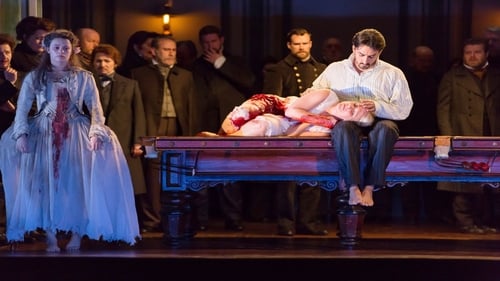
Writer
Lucia’s brother Enrico is horrified to learn she has fallen in love with his sworn enemy Edgardo. He hastily arranges her marriage to his associate Arturo. Edgardo and Lucia privately exchange rings before he leaves to fight in France. Enrico tricks Lucia into believing that Edgardo has been unfaithful. Longing for death, she signs the contract with Arturo – moments before Edgardo returns. Lucia murders Arturo in their wedding bed. His death is followed first by Lucia’s, and then by Edgardo’s.
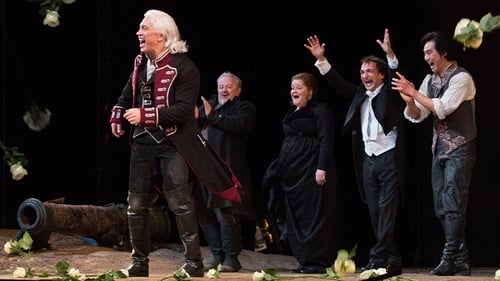
Writer
Soprano Anna Netrebko appears in her highly anticipated Met role debut as Leonora, the tortured heroine who sacrifices her own life for the love of the Gypsy troubadour. Dmitri Hvorostovsky sings Count di Luna, Yonghoon Lee is Manrico in his Met role debut as the title character, Dolora Zajick sings her signature role of the gypsy Azucena, and Štefan Kocán is Ferrando. Marco Armiliato conducts Sir David McVicar’s Goya-inspired production.

Writer
New production. UK professional premiere May 21, 2015. Live from Glyndebourne.

Writer
Daniel Barenboim conducts the Staatskapelle Berlin in this production of Verdi's opera starring Anna Netrebko and Plácido Domingo. The Count Di Luna believes that his younger brother was murdered years before by a vengeful gypsy but still hopes that he may be alive. When he attempts to court the beautiful Leonora, he is enraged to discover that she has a lover – the troubadour, Manrico. Manrico and the Count duel, and afterwards Manrico reveals to Azucena, the woman he believes to be his mother, that when he had the opportunity to kill the Count he felt something holding him back.

Writer
Part of Tutto Verdi series - Alzira (2012) Dobbiaco. This is a concert performance. Alzira is an opera in a prologue and two acts by Giuseppe Verdi to an Italian libretto by Salvatore Cammarano, based on the play Alzire, ou les Américains by Voltaire. The first performance was at the Teatro San Carlo, Naples, on 12 August 1845.
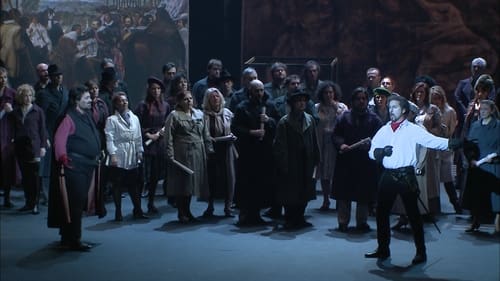
Writer
Part of Tutto Verdi series - La battaglia di Legnano (2012) Trieste. 'La battaglia di Legnano' ('The Battle of Legnano') is an opera in four acts, with music by Giuseppe Verdi to an Italian-language libretto by Salvadore Cammarano. Most of the early Verdi operas are sort of rare for a reason. They do not rise to the heights of genius that his middle period and late period operas did. However, there are always some beautiful arias or choruses and most of them are great fun......sort of like bel canto on steroids! What I mean is that you can hear that he was coming from the bel canto tradition, but he liked to inject a lot more power into the characters and their music.
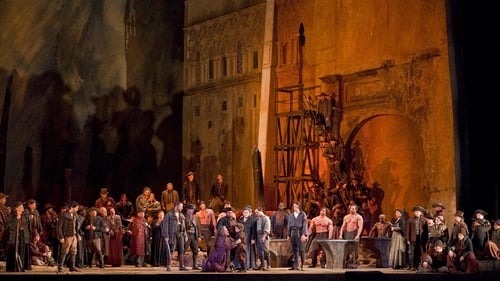
Writer
Verdi’s IL TROVATORE again storms the Met stage in a star-studded, anvil-wielding cast , including Sondra Radvanovsky, Dolora Zajick and Dmitri Hvorostovsky. Marcelo Álvarez sings Manrico, the troubadour of the title. The story is well-known already: The gypsy Azucena has harbored a grudge for thirty years, but she is about to have revenge at last. Meanwhile, her son Manrico is in love with Leonora, but so is his arch-enemy, the Count Di Luna. A pot-boiler, where every tune is a hit.
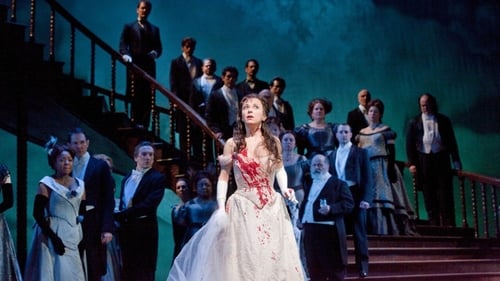
Lyricist
The tragic tale of "the bride of Lammermoor" has always been a favorite of opera-goers and sopranos alike. Yet with the riveting singing actress Natalie Dessay in the title role, Lucia's plight and descent into madness take on another dimension. Joseph Calleja is an ardent Edgardo, the man she loves but is not allowed to marry. Instead, her brother Enrico forces her into a union with the rich Arturo to save the family fortunes. It proves too much to bear for Lucia.

Writer
This recording of "Il Trovatore" was held in Parma in 2010. The production is minimalistic. The scenario reminds, vaguely, the lunar surface. In the background, in several scenes, there is a huge full moon, sometimes white, sometimes red - the effect is beautiful and suitable for the nocturnal atmosphere of this opera. Few objects in the scene, including a big horse and giant candles. The costume indicates, directly, who is who: soldiers, nuns, gypsies. Regarding the musical aspects: excellent participation of choir and orchestra. The conductor is the seasoned Yuri Temirkanov. He keeps the orchestra under control (though there is one or two moments of disagreement with the singers), with some pleasant surprises.

Writer
Star soprano Anna Netrebko adds Donizetti’s hapless heroine to her growing list of Met triumphs in this production by Mary Zimmerman that updates the events to the 19th century. Rising young tenor sensation Piotr Beczała is Edgardo and Mariusz Kwiecien plays Lucia’s brother Enrico whose brutal authority forces her to deny her heart and marry for the sake of her family. The famous mad scene brilliantly depicts the cascading fragments of Lucia’s disintegrating mind.

Writer
Part of Tutto Verdi series - Luisa Miller (2007) Parma.

Writer
Live from Munich, 2005. London, 1601: love, lust and a death sentence at the English royal court - that's just the mix for great Italian opera. Roberto Devereux - an opera for a sovereign, a work for Edita Gruberová! The prima donna assoluta of bel canto triumphs in this drama. Either an opera house can acquire the services of "la Gruberová" - or they can forget putting on this opera.

Writer
Live from the Teatro Carlo Felice di Genova 2003

Writer
José Cura, Dmitri Hvorostovsky, Verónica Villarroel and Yvonne Naef lead the star cast of Verdi's blazingly passionate opera IL TROVATORE, in Elijah Moshinsky's new Royal Opera House production co-produced with Teatro Real Madrid, with sets by the noted film designer Dante Ferretti and costumes by Anne Tilby.

Writer
A lyric tragedy in three acts by Gaetano Donizetti, libretto by Salvatore Cammarano. Roberto Devereux was composed in the summer of 1837, the year, according to biographers, in which Donizetti seems to have suffered most, having lost his third son and his adored wife Virginia Vasselli. The opera made its debut at the San Carlo Theatre in Naples on October 28th in the same year and was a great success. The rehearsals of the original performance were postponed for a month due to censorship of the decapitation scene of the leading actor.

Writer
Live from La Scala Wednesday 13 May 1992
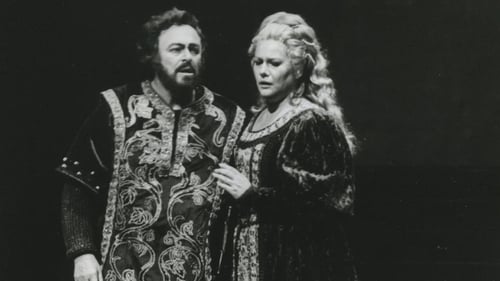
Writer
Luciano Pavarotti brings his spectacular voice and artistry to one of the most famous of all tenor roles—Manrico, the ardent troubadour, trapped in an impossible situation by forces beyond his control. The sensational Dolora Zajick, only days after her Met debut, gives an incandescent performance as the demented gypsy Azucena, thirsting for revenge against Count Di Luna (Sherrill Milnes). Eva Marton is the passionate Leonora, desired by both Manrico and the Count, and James Levine brilliantly leads the Met’s orchestra and chorus in some of Verdi’s best-known music.

Writer
tt0253843. Il Trovatore (1985) Verona. Verdi / Italian.
Reynald Giovaninetti conducts the Orchestra of the Arena di Verona in a performance of Verdi's 'Il Trovatore'. The international cast includes Giorgio Zancanaro and Rosalind Plowright. The Count Di Luna believes that his younger brother was murdered years before by a vengeful gypsy, but still hopes that he may be alive. When he attempts to court the beautiful Leonora, he is enraged to discover that she has a lover - the troubadour, Manrico. Manrico and the Count duel, and afterwards Manrico reveals to Azucena, the woman he believes to be his mother, that when he had the opportunity to kill the Count he felt something holding him back.
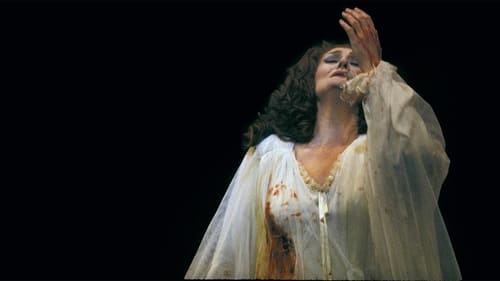
Writer
This telecast offers a rare opportunity to see the legendary Joan Sutherland in the role that first catapulted her to international stardom. She drove audiences wild by the way her opulent voice caressed the music’s long phrases and sprinted effortlessly through the fiendish runs, trills, embellishments and stratospheric high notes. One of the glories of the operatic world, her portrayal of Donizetti’s hapless heroine is a multifaceted and moving characterization. The incomparable tenor Alfredo Kraus is Edgardo, the man Lucia loves but cannot have. (Performance taped November 13, 1982. Broadcasted September 28, 1983.)

Writer
The gypsy Azucena (Fiorenza Cossotto) takes revenge for her mother who was accused of putting a curse on one of the old Count di Luna's two sons: she decides to abduct the younger child and throw it in the flames. But when she is about to carry out this fatal act, the gypsy sacrifices her own child and keeps the old Count’s son, whom she names Manrico (IL TROVATORE, Plácido Domingo). Later, as adults, the troubadour Manrico and the Count di Luna’s elder son (Piero Cappucilli) do not know each other, but become rivals for the beautiful Leonora (Raina Kabaivanska). Manrico succeeds in winning the young woman’s heart, and she sacrifices herself for him, deceiving the Count’s son. Mad with jealousy, the latter orders the execution of the troubadour in front of his mother. Azucena reveals to him that Manrico was his brother. This legendary performance of Giuseppe Verdi's most successful opera was recorded at the Vienna State Opera under the baton of Herbert von Karajan.

Writer
Features: Mario Del Monaco Leyla Gencer Ettore Bastianini Fedora Barbieri Laura Londi Plinio Clabassi Orchestra Sinfonica e Coro di Milano dell RAI Radiotelevisione Italiana

Writer

Original Music Composer
I Love to Singa depicts the story of a young owl who wants to sing jazz, instead of the classical music that his German parents wish him to perform. The plot is a lighthearted tribute to Al Jolson's film The Jazz Singer.












